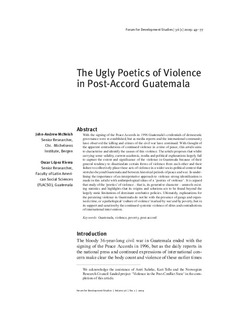| dc.contributor.author | McNeish, John-Andrew | |
| dc.contributor.author | Rivera, Oscar Lopez | |
| dc.date.accessioned | 2018-01-04T08:16:08Z | |
| dc.date.available | 2018-01-04T08:16:08Z | |
| dc.date.issued | 2009-10-26 | |
| dc.identifier | oai:www.cmi.no:3499 | |
| dc.identifier.citation | in Forum for Development Studies. The Nordic Journal of Development Research vol. 36 no. 1 pp. 49-77 | |
| dc.identifier.uri | http://hdl.handle.net/11250/2474590 | |
| dc.description.abstract | With the signing of the Peace Accords in 1996 Guatemala's credentials of democratic governance was re-established, but as media reports and the international community have observed, the killing and crimes of the civil was have continued. With thought of the apparent contradicitions of continued violence in time of peace, this article aims to characterise and identify the causes of this violence. Ultimately, the explanations for the persisiting violence in Guatemala do not lie with the presence of gangs and organised crime, or a pathological "culture of violence" marked by war and poverty, but in its support and sanction by the continued systemic violence of elites and contradictions of international intervention. | |
| dc.language.iso | eng | |
| dc.relation | Forum for Development Studies | |
| dc.relation | 1 | |
| dc.relation.ispartof | Forum for Development Studies | |
| dc.relation.ispartofseries | Forum for Development Studies vol. 36 no. 1 | |
| dc.relation.uri | https://www.cmi.no/publications/3499-the-ugly-poetics-of-violence-in-post-accord | |
| dc.subject | Violence | |
| dc.subject | Poverty | |
| dc.subject | Post-Accord | |
| dc.subject | Guatemala | |
| dc.title | The ugly poetics of violence in post-accord Guatemala | |
| dc.type | Journal article | |
| dc.type | Peer reviewed | |
| dc.identifier.doi | 10.1080/08039410.2009.9666425 | |
